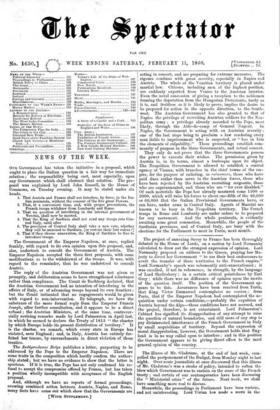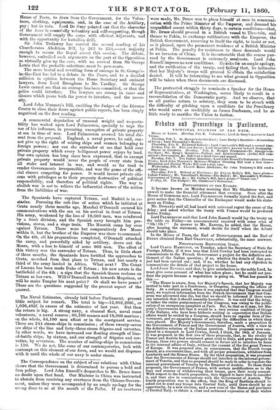The illness of Mr. Gladstone, at the end of last
week, coin- pelled the postponement of the Budget, from Monday night to last night. Over acute journalists at once discovered that this illness of Mr. Gladstone's was a stroke of policy, intended to soften the blow which Government was to sustain on the score of the French treaty ; and certain of our contemporaries have been discussing the " Ministerial crisis " of the future. Next week, we shall have something more real to discuss. Meanwhile, the proceedings in Parliament have been various, and not uninteresting. Lord Vivian has made a move in the
House of Peers, to draw from the Government, for the Volun- teers, clothing, equipments, and, in the ease of the Artillery, pay ; but in vain. Lord De Grey pointed out that the character of the force is essentially voluntary and self-supporting, though Government will supply the corps with efficient Adjutants, and with the opportunity for battalion drill.
Sir John Trelawny has carried the second reading of his Church-rates Abolition Bill, by 263 to 234,—not majority enough to secure the Royal assent this session. The debate, however, embodied such arguments on the part of the Opposition as virtually give up the case, with an avowal from Sir George Lewis that the probable substitute must be pew-rents.
The more brutal and revolting form of outrage in St. George's- in-the-East has led to a debate in the Peers, and to a decided collision in opinion between the Home Secretary and eminent lawyers, from Lord Brougham to Mr. Yardley. Sir George Lewis cannot see that an outrage has been committed, or that the police could interfere. The lawyers are strong in cases and clauses which prove both the power to interfere, and the neces- sity.
Lord John Manners's Bill, enabling the Judges of the Divorce Courts to close their doors against public reports, has been simply negatived on the first reading.































 Previous page
Previous page